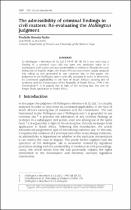| dc.contributor.author | Njoko, Thulisile Brenda | |
| dc.date.accessioned | 2022-05-03T08:04:21Z | |
| dc.date.available | 2022-05-03T08:04:21Z | |
| dc.date.issued | 2021 | |
| dc.identifier.citation | Njoko, Thulisile Brenda ‘The admissibility of criminal findings in civil matters: Re-evaluating the Hollington judgment’ De Jure 54:1 (2021) pp. 160–173 | en_US |
| dc.identifier.issn | 2225-7160 | |
| dc.identifier.uri | http://dx.doi.org/10.17159/2225-7160/2021/v54a10 | |
| dc.identifier.uri | http://hdl.handle.net/10566/7338 | |
| dc.description.abstract | In Hollington v Hewthorn & Co Ltd 2 1943 All ER 35 it was held that a finding of a criminal court did not have any probative value in a subsequent civil action and was inadmissible as evidence. Despite the case being one of English origin, the South African courts have largely adopted this ruling as one grounded in our common law. In this paper, the judgment in the Hollington case is critically analysed in order to determine its continued applicability in the face of South Africa's existing law of evidence and the Constitution of the Republic of South Africa, 1996 ("the Constitution"). It is argued that in light of the existing law, this rule no longer finds application in South Africa. | en_US |
| dc.language.iso | en | en_US |
| dc.publisher | Pretoria University Law Press | en_US |
| dc.subject | Criminal findings | en_US |
| dc.subject | Hollington judgment | en_US |
| dc.subject | Criminal court | en_US |
| dc.subject | The Constitution of the Republic of South Africa, 1996 | en_US |
| dc.subject | Civil case | en_US |
| dc.subject | Civil law | en_US |
| dc.title | The admissibility of criminal findings in civil matters: Re-evaluating the Hollington judgment | en_US |
| dc.type | Article | en_US |

